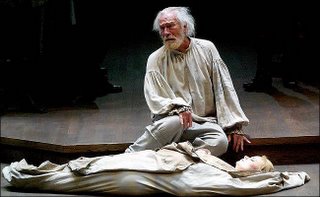Lear

I've been thinking about King Lear the last couple of days as I may return to directing a staged reading projec that almost happened this spring.
To me, Lear has all of life in it. Lear is a king, but he is also a father and a man. It is an epic tragedy and a family drama. While it is almost mercilessly tragic, I believe the play, ultimately, is about redemptive love.
The picture here is from a production that Christopher Plummer did in New York (following a stint at Canada's Stratford Festival) in 2004. Lear is pictured with the lifeless body of his youngest daughter Cordelia, whom he banished in the first scene because she would not play along in a public competition of "who loves daddy best" with her two scheming sisters. By the end of the play Lear has lost just about everything, including his mind depending on how you interpret things. But his last words, as he mourns over his daughter's body, are, "Look there. Look there." To me, those lines are filled with hope. Hope for those of us who have watched this spectacle of our human capacity for cruelty. After being horrified, angered, and moved by Lear and his family, we can finally learn from them. That is what makes this such a rich and timeless work, in my opinion.
This morning I am just ruminating on how much of a family drama King Lear is. Yes, he is a king and the daughter's are scheming to control a kingdom. But it could be the family estate they are after. The family business. The family china. Strip away the royal trappings, and I believe you can trace a line from Lear to Strindberg (Dance of Death), to O'Neill (Long Day's Journey), to Albee (Who's Afraid of Virginia Woolf, A Delicate Balance) to Pinter (The Homecoming).
You don't have to be a mad king to be tempted to ask your children, "Which of you shall we say doth love us most?" That is Lear's question that sets in motion the tragic events. A parent needing a declaration of love.
There are so many other themes and ideas in this play. I may use this blog to sort more of them out. But for today, King Lear is a domestic drama that shows our human penchant for cruelty and our potential for forgiveness and love. Probably wouldn't need one without the other.


3 Comments:
Sounds very cool. Like to see you do that play.
Hi Chris,
Thanks very much for this post on King Lear. I have not read the play nor seen any stage version of it, but your interpretation makes me very interest in doing so.
Curious about one thing...You mentioned thinking of returning to direct a staged reading project of King Lear. Have you directed many Shakespeare productions and if so, which plays? Also...I remember hearing an interview with Kevin Kline and he was talking about Americans, meaning actors, directors etc, being kind of intimidated by Shakespeare, because there is the traditional thinking that Shakespeare *must* be performed by the English. Do you think there's any truth to this?
Maria
Most moviegoers like happy endings. But this doesn't necessarily apply to people that attend live plays. People willingly attend plays about stories that are well known and end on a sad note. The same may apply to people that attend operas, I don’t know. I know very little about opera except what I'm told. The stories can become rather foolish and often contain whores.
I’ve never read King Lear but I’m not sure if “Look there. Look there,” got Shakespeare off the hook. I find these to be strange words to be spoken at such a time when there were plenty of other words to choose from. But not knowing King Lear or what he said throughout the story, perhaps these words ‘were filled with hope.’
Tommy D
PS; The movie, One Flew Over The Cuckoo’s Nest was one of the few Hollywood blockbusters that ended in tragedy, and it did end in tragedy because for me the movie ended before that big Indian broke out. I felt little redemption for him although I was happy to see him go but mostly I felt lots of remorse with an underlying anger. On the other hand, Thelma and Louise were fun to watch, but their tragic ending was just another Hollywood stunt. It didn’t bother me at all.
Today, main stream Hollywood seems absolutely terrified to end a movie on a sad note. It just isn’t done. The weekend kids are all searching for fun.
Post a Comment
<< Home